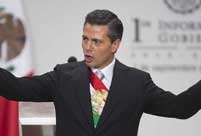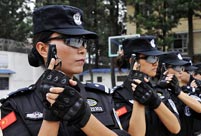 China's new-type guided missile frigate 'Bengbu' in live fire training
China's new-type guided missile frigate 'Bengbu' in live fire training
 China’s weekly story (2013.8.10 - 8.23)
China’s weekly story (2013.8.10 - 8.23)
 Flight team performs first show abroad
Flight team performs first show abroad
 With parents bedridden, 12-year-old boy becomes pillar of the family
With parents bedridden, 12-year-old boy becomes pillar of the family
 Top 10 private Chinese enterprises 2013
Top 10 private Chinese enterprises 2013
 The most gorgeous Chinese women in the eyes of foreigners
The most gorgeous Chinese women in the eyes of foreigners
As the Obama administration gears up to take military actions on embattled Syria, some U.S. experts warned such a move could backfire.
Ramping up U.S. involvement in the chaotic country could be messy, too, they said, adding that there is no guarantee that U.S. forces will locate the alleged chemical weapons.
Moreover, innocents are likely to be caught in the crossfire, which will prompt critics to blast Washington.
The experts also said the U.S. is not in a position to conduct a third war in 12 years, adding that an attack on Syria would be a far cry from the 2011 ouster of former Libyan leader Muammar Gaddafi.
Libya had virtually no military and was internationally isolated. By sharp contrast, Syria is backed by Hezbollah, Iran and Russia.
Some analysts painted a picture of what a strike might look like.
"Since the U.S., the U.K. and any other NATO forces involved wish to avoid losing aircraft and aircrew over Syrian government controlled territory, attacks almost certainly would be limited to cruise missiles, long-range aircraft-mounted standoff munitions, as well as, perhaps, a few stealth fighters able to snake their way through Syrian air defenses," said Wayne White, former deputy director of the State Department's Middle East Intelligence Office.
Command and control targets could range from targets as large as the Syrian Defense Ministry down to individual important unit headquarters elements, such as those associated with the elite 4th Mechanized Division and the Republican Guard Division, White, now a scholar at the Washington-based Middle East Institute, told Xinhua.
Jeffrey Martini, a Middle East analyst with policy research group Rand Corp., claimed the U.S. move is largely driven by the need to retain its credibility worldwide, as President Barack Obama had said any use of chemical weapons in Syria would cross a "red-line" that could spark military action.
But other experts questioned the point of the U.S. motive, saying such a move would do little to project a stronger image around the world.
A strike could even backfire, some critics warned.
In 1998, two weeks after the al-Qaida attack on two U.S. embassies in Africa, then U.S. President Bill Clinton lobbed cruise missiles at a factory in Sudan and an al-Qaida training camp in Afghanistan.
But the attacks did very little damage and emboldened terror mastermind Osama bin Laden to launch the Sept. 11 attacks on New York and Washington - the most deadly terror strike in U.S. history.
 Mexican president delivers first State of Nation address
Mexican president delivers first State of Nation address Highlights of MAKS 2013 Int'l Aviation and Space Show
Highlights of MAKS 2013 Int'l Aviation and Space Show  Top 10 Chinese provinces for the well-heeled
Top 10 Chinese provinces for the well-heeled  Baby born to save his sister - the story of a savior sibling
Baby born to save his sister - the story of a savior sibling Lady of mystery: Female SWAT team in prison disclosed
Lady of mystery: Female SWAT team in prison disclosed  Single mother, baby live in KFC restaurant for months
Single mother, baby live in KFC restaurant for months Fan Bingbing poses for Malaysian magazine Citta Bella
Fan Bingbing poses for Malaysian magazine Citta Bella Zhang Xinyi covers COSMOPOLITAN
Zhang Xinyi covers COSMOPOLITAN A collection of bizarre rooftop buildings around China
A collection of bizarre rooftop buildings around China Putin intimate contacts with marine animals
Putin intimate contacts with marine animals China's frigate 'Bengbu'in fire training
China's frigate 'Bengbu'in fire training Fresh students 'forced' to register in university independently
Fresh students 'forced' to register in university independently 2013 Taiwan Int'l Tourism Expo kicks off in Taipei
2013 Taiwan Int'l Tourism Expo kicks off in Taipei Photo story: Take a gap year
Photo story: Take a gap year Nokia's Global Headquarters: visiting a declining empire
Nokia's Global Headquarters: visiting a declining empireDay|Week|Month